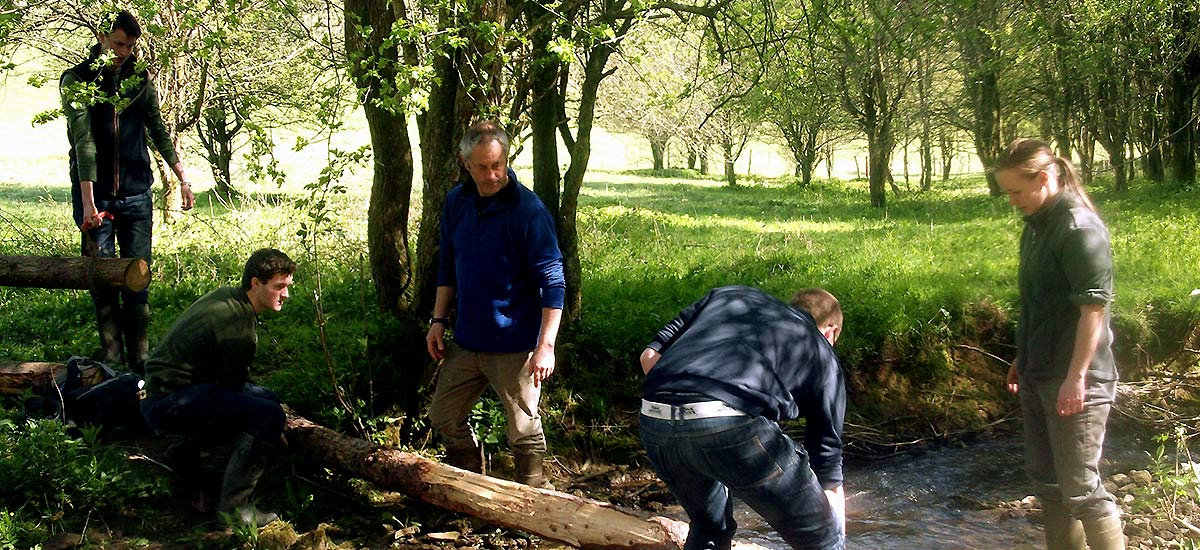BSc (Hons) Wildlife and Countryside Management (Top-up)
Interested in roles such as a Biodiversity Officer, Ecological Consultant, or Countryside Manager? These are just some of the positions open to you after this course, designed with organisations directly involved in conservation.
Graduates have gone on to work at nationally-recognised organisations such as the Wildlife Trusts, the National Trust and the Farming and Wildlife Advisory Group.
Course overview
Understanding both the big picture and the detail will help you become an effective manager of wildlife and the countryside. You will practice key skills for employment in each of these sectors including protected species surveys, professional report writing, grant applications, legislative requirements and client liaison. This course brings together academic knowledge and research skills to best inform the sustainable management of wildlife and the countryside moving forward.
Industry experience
A key part of your studies will be the research project where you showcase your specialist knowledge and research skills. Previous topics have spanned a wide choice of habitats, species and countryside issues. Your learning will be directed by research-active lecturers and industry experts. The course has been designed with input from employers and industry to maximise your employability prospects after graduation.
Course content
You will learn through lectures, seminars, projects, visits and demonstrations. Modules are mainly assessed through coursework with occasional timed assessment for some subject matter. Where possible, coursework reflects the expectations of industry and can therefore include things like professional practice reports, case study evaluations, grant applications, oral presentations, team activities, alongside the more traditional academic literature reviews and essays, academic posters etc. A key element of the top-up degree is the Honours Dissertation in which you will propose a research idea, develop a hypothesis and experimental design, before generating new information, helping to progress your wider knowledge and understanding.
Timetables
Please note that while we make every effort to ensure that timetables are as student-friendly as possible, scheduled teaching can take place on any day of the week. Wednesday afternoons are normally reserved for sports and societies activities.
Modules
All full-time academic programmes at the RAU are constructed using a selection of modules, each of which requires engagement with a variety of learning activities. Successful completion of module assessments will result in the award of credits, and students are required to achieve a total of 120 credits. Part-time students are required to achieve a 60 credits per year over two years.
Each 20-credit module represents a minimum of 150 hours of student learning, effort and assessment. To achieve the award of BSc Honours in Wildlife and Countryside Management, a student must achieve a minimum of 120 credits. For this BSc (Hons) Top-up course, your grade is calculated entirely on this course's modules.
The modules available for this degree are shown below. They may change for your year of study as we regularly review our module offerings to ensure they’re informed by the latest research and teaching methods.
Core modules
- 6W001 Countryside & Environmental Management: This module addresses contemporary countryside issues such as biodiversity loss, climate change, and rural development. Students explore policy, land management strategies, and sustainability through field visits and case studies. Assessment includes a 1500-word grant application, a presentation of a countryside improvement plan, and a 7-day timed assessment. The module develops applied knowledge and strategic thinking for environmental management careers.
- 6M001 Research Project: This module enables students to undertake an independent research project aligned with their subject area. Topics are student-selected and supported through supervisor meetings and workshops. Assessment includes a 5-minute progress presentation and a 12,000-word thesis or multimedia portfolio. The module supports critical evaluation, ethical research design, and evidence-based recommendations for real-world challenges.
- 6W003 Wildlife Behaviour & Evolution: This module explores evolutionary theory and behavioural ecology across diverse taxa and ecosystems. Students examine feeding, reproductive, and social behaviours, alongside ecological processes such as parasitism and interspecific interactions. Field trips and practical sessions support learning. Assessment includes a group presentation and a 2000-word scientific report based on a designed and executed behavioural experiment. The module fosters ecological research skills and critical understanding of wildlife management.
- 6W004 Environmental and Ecological Consultancy: This module prepares students for professional consultancy roles in environmental and ecological sectors. Topics include legislation, species surveys, impact assessments, and client communication. Students engage with fieldwork, case studies, and guest lectures. Assessment includes a 2000-word literature review and a 2000-word professional practice report. The module supports critical evaluation of consultancy frameworks and the application of ecological knowledge in real-world development scenarios.
Plus ONE elective selected from the following:
- 6W005 Climate Change and Natural Resource Management: This module explores the intersection of climate change and natural resource management. Topics include soil health, biodiversity, water systems, and sustainable agriculture. Students engage with field visits, case studies, and policy analysis. Assessment includes a poster presentation and a multiple-choice exam. The module supports critical evaluation of climate impacts, mitigation strategies, and sustainable resource use across global and local contexts.
- 6L003 Forestry and Natural Resources: This module examines woodland and natural resource management in rural and urban contexts. Students explore tree identification, silviculture, ecosystem services, and natural capital. Emphasis is placed on sustainability, biodiversity, and balancing timber production with environmental benefits. Assessment includes a 2400-word woodland management plan and a 1600-word portfolio of artefacts. The module supports applied ecological knowledge, critical thinking, and sustainable land use planning.
- 6A002 Agri-Food Systems and Policies: This module examines food systems through systems thinking and the One Health framework. Topics include food security, policy development, economics, and regenerative agriculture. Students engage with debates, case studies, and guest speakers. Assessment includes a 1000-word academic poster and a 2500-word literature review. The module supports critical evaluation of global food policy, health interconnections, and sustainable system design.
If you’ve already secured employment, you may elect to follow the Improving Personal Professional Practice module thus reducing the time required to attend campus-based modules.
The availability of electives to individual students will be dependent on timetabling considerations and on sufficient students electing to take part.
Disclaimer information
The University has established various rules and regulations that you must agree to and follow if you accept an offer to study with us. View our full disclaimer notice.
Careers and graduate destinations
- Conservation / biodiversity officer
- Ecological consultant / surveyor
- Reserve ranger
- Agri-environment manager
- Habitat and landscape project officer
- Land restoration manager
"The trip began to give me an insight into what I might want to do after university. I approached Ruskin Mill about completing my work placement there as I felt I had so much more to see and learn, and three months later I began my placement!"
Alexandra Buckingham Jarvill, Graduate
Entry requirements
Typical offers
- A foundation degree or an HND award in a related subject, achieving 240 credits overall and gained in the last five years
- GCSE: no specific English and Mathematics requirements
Flexible entry
The University welcomes interest from applicants who may not have the standard entry requirements. A wide range of qualifications and experience are accepted in order to join University degree programmes. The University always considers evidence of personal, professional (APL) and educational experience, (APEL), which show an ability to meet the demands of their intended programme of study.
Further information
Read more general information about our entry requirements.
International students will also need to achieve IELTS Academic or equivalent at the appropriate level for your programme of study. English language requirements for international students.
For any further help, please contact our admissions team:
- Email: admissions@rau.ac.uk
- Telephone: +44 (0)1285 889912
Fees
2026-27 Applicants
For the academic year 2026-27 the tuition fees for this course are:
| UK | International | |
|---|---|---|
| Full-time | £9,790 per year | £16,950 per year |
For part-time study, please contact admissions@rau.ac.uk for further information.
Please also refer to the funding your time at university page.
Tuition fees may be subject to an inflationary increase each year as set out in our Access and Participation Plan and are subject to Government and regulatory body conditions.
If you are an Irish national you can check if you meet the requirements for Home Fees. Please visit the UKCISA website and consult the pdf guide “England HE – who pays Home Fees”. First check category ‘3 years in Republic of Ireland/UK/Islands, settled in UK’ or ‘Brexit temporary offer for courses starting before 2028: Irish citizens with residence in Europe or overseas territories’. You will possibly need to be fee assessed when you submit an application for study to the RAU.
Scholarships
The University offers a wide range of generous fee waivers and bursaries. To find out more about the these, please visit the bursaries, awards and scholarships page.
Ready to take the plunge? Apply now
Applications should be made by the UCAS deadline to ensure we are able to offer you a place on your first choice course. However, if you have missed the deadline please contact Admissions@rau.ac.uk as there are usually places available.
If you would like to apply during UCAS Extra or Clearing, please check that we have places available.
Applicants wishing to study on a course on a part-time basis will need to apply directly to the RAU.
Please contact admissions@rau.ac.uk to discuss your requirements and obtain an application form.



